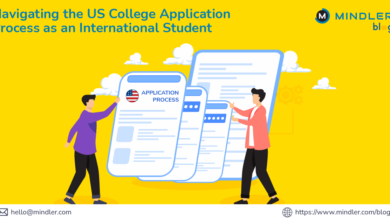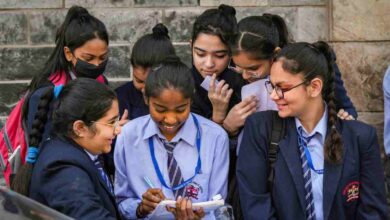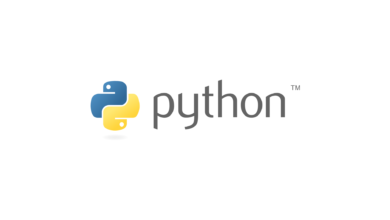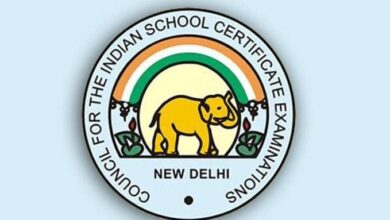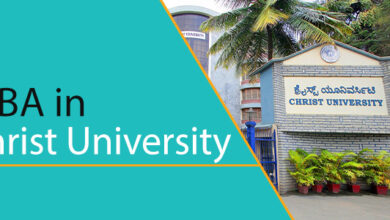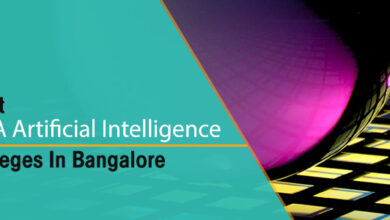Courses to Become a Doctor: Detailed overview of BDS, MBBS, BPT, BAMS, BHMS, BVSc, and Pharm D courses
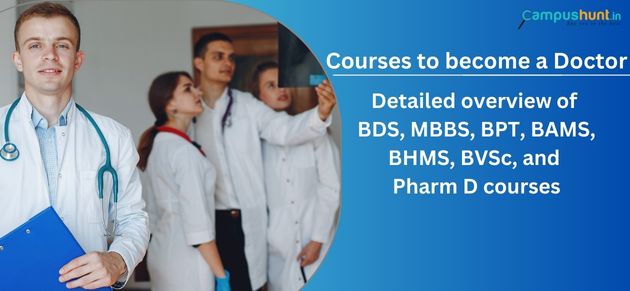
 Many people have the dream of becoming doctors. Although “I want to be a doctor” is a common goal, different medical aspirants have different motivations for pursuing this career. Others simply view it as a fantastic business opportunity and a sign of success. Some people want to provide healthcare services to the underprivileged; others wish to offer medical services in underserved and rural areas. Well, congrats if you made the decision to become a doctor for a good cause. You have come to the right place if you are a student who is unsure about pursuing a medical degree and who is terrified of being asked “How to become a doctor?” Here are the top degrees to help you understand why a career in medicine is a good choice and why you should become a doctor for you and all other students who are on the verge of picking a career or the ones who are struggling to figure out what to do with their job life:
Many people have the dream of becoming doctors. Although “I want to be a doctor” is a common goal, different medical aspirants have different motivations for pursuing this career. Others simply view it as a fantastic business opportunity and a sign of success. Some people want to provide healthcare services to the underprivileged; others wish to offer medical services in underserved and rural areas. Well, congrats if you made the decision to become a doctor for a good cause. You have come to the right place if you are a student who is unsure about pursuing a medical degree and who is terrified of being asked “How to become a doctor?” Here are the top degrees to help you understand why a career in medicine is a good choice and why you should become a doctor for you and all other students who are on the verge of picking a career or the ones who are struggling to figure out what to do with their job life:
MBBS: Bachelor of Medicine and Bachelor of Surgery
The Latin phrase Medicinae Baccalaureus Baccalaureus Chirurgiae, which stands for Bachelor of Medicine and Bachelor of Surgery, is commonly referred to as MBBS or BMBS. An undergraduate degree study in medicine and surgery is called MBBS. A person becomes a licensed medical practitioner after earning an MBBS from one of the top medical schools because it is likely one of the best degrees in the world. Bachelor of Medicine and Bachelor of Surgery, or MBBS, is an extremely drawn-out course of study that calls for a tremendous amount of forbearance and aptitude. The bravest and most humble vocation is that of a medical professional. The bravest and most humble vocation is that of a medical professional. The participants can learn how to diagnose and treat particular disorders using the MBBS curriculum’s descriptions of various medical specialties and human anatomy. MBBS degrees encompass a range of medical disciplines so that students can gain a thorough understanding of their chosen field. Because admissions to the MBBS programme are based on NEET exam rank, it is a very competitive programme. Every year, thousands of students take the NEET exam to get admitted to MBBS programmes. To prepare for the NEET exam and gain admission to renowned medical institutes in India, many students skip a year of school.
Eligibility Criteria:
- Although the minimum score requirements can vary, general applicants must have received at least 50% on the intermediate test. To take the MBBS NEET exam, you must be at least 17 years old. Candidates should have completed at least 10 + 2 with Physics, Chemistry, and Biology as required subjects. Candidates must have a minimum of 40% to be qualified for the reserved category. The MBBS course’s age restriction is 25 years at the most.
- NEET: Previously known as the All India Pre-Medical Test (AIPMT), the National Eligibility cum Entrance Test (Undergraduate) or NEET (UG) is an all-India pre-medical entrance exam for students wishing to enrol in undergraduate medical (MBBS), dental (BDS), and AYUSH (BAMS, BUMS, BHMS, etc.) programs in government and private institutions in India as well as for those planning to pursue primary medical education abroad.
| Entrance test | NEET: National Eligibility cum Entrance Test |
| Conducting body | National Testing Agency |
| Attempt Limit/ Age limit |
No Limit/ Age: Lower limit:17 years plus as on December 31, current year Upper age Limit: None |
| Exam Level | National Level Exam |
| Languages |
Assamese Bengali English Gujarati Hindi Kannada Malayalam Marathi Oriya |
| Mode of application/Mode of Counselling | Online/ Online and Offline |
| Exam Duration | 3 Hours and 20 Minutes |
| Nationality | Indian Nationals, NRIs, PIOs, OCIs and Foreign Nationals |
| Eligibility Mark Percentage |
Gen/ OBC: Minimum 50% in PCB and aggregate SC/ST: Minimum 40% PwD: 45% |
| Documents Required at the time of Examination |
NEET admit card One passport size photograph PAN Card/Driving License/Voter ID/Passport/Aadhaar Card (with photograph) /Ration card/any other valid government ID PwD certificate issued by the competent authority if applicable Letter of undertaking of own scribe if applicable |
Students can enrol in the MBBS programme offered by various universities and schools in a number of ways. The educational institutions that provide the Bachelor of Medicine and Bachelor of Surgery programmes have different recruitment strategies they employ to enrol students. Candidates must adhere to the various tactics with a full understanding in order to be admitted to universities and earn an MBBS degree. The numerous processes for admitting candidates to the MBBS degree are discussed here.
- Entrance examinations: NEET
- Merit-based: Some institutions and universities in these programmes grant admission to applicants based on their 10+2 marks. MBBS eligibility requirements are based on skills acquired in 10+2. These colleges frequently accept applicants based on their cut-off lists. However, there are very few of these colleges, and the medical entrance exam is a requirement for this particular degree.
Top MBBS Medical Colleges in India
- Bangalore Medical College and Research Institute, Bangalore
- Kempegowda Institute of Medical Sciences, Bangalore
- ACMS Delhi
- ESI Post Graduate Institute of Medical Sciences and Research, Bangalore
- Dr BR Ambedkar Medical College, Bangalore
- Sapthagiri Institute of Medical Sciences and Research Center, Bangalore
- AIMS Mandya
- Vydehi Institute of Medical Sciences and Research Centre, Bangalore
- AIMS Thrissur
- BGS Global Institute of Medical Sciences, Bangalore
- ARMCH Solapur
- AVMC Pondicherry
- BMC Hyderabad
- BMCH Chitradurga
- BVMC Pune
- CMC Ludhiana
- CMC Vellore
- AFMC Pune
- AIIMS Bhopal
- AIIMS Bhubaneswar
- AIIMS Delhi
- AIIMS Deoghar
- AIIMS Jodhpur
- AIIMS Nagpur
- AKU Patna
- ANIIMS Port Blair
- ANMMCH Gaya
Students pursuing a Bachelor of Medicine or Bachelor of Surgery are very focused on the medical field. MBBS students can find employment in both the public and private sectors. The sectors of biomedical firms, medical facilities, healthcare facilities, laboratories, emergency rooms, community health centres, and private practice all offer more than enough employment opportunities for these specialists. With the growth and commercialization of the healthcare sector, students seem to have a wide range of options after completing their MBBS programme.
BDS Bachelor of Dental Surgery
One of the most sought-after programmes in the medical field after MBBS is a Bachelor of Dental Surgery, or BDS for short. Candidates who want to advance in a dental practice can learn all about BDS from this post. In India, the BDS degree is the only undergraduate degree that is accredited and regarded as providing comprehensive information, understanding, and abilities in dental surgery and training. The BDS undergraduate programme lasts five years, of which four years are devoted to theory and one year to a cyclical internship. The Dental Council of India (DCI) regulates the BDS curriculum. Students must take the National Eligibility Completion Entrance Test (NEET) in order to be admitted to one of the 26,949 BDS seats available at the nation’s 313 government, private, and deemed institutions. All other exams, besides NEET, will not be taken into consideration for BDS admission. The undergraduate BDS programme lasts four years. The BDS programme is available to candidates who desire to become dental surgeons. The main areas of focus for BDS include dental extractions, fillings, scaling, and smile design through the process of tooth alignment, which necessitates placing braces on a person’s upper and lower tooth surfaces for a period of time. Many people experience excruciating pain as a result of their wisdom teeth, and they travel to dental offices to have them extracted. BDS graduates who possess the necessary accreditation also administer anaesthetic to soothe the patient and prevent severe pain during the tooth extraction. For this programme, students must have PCB in their 10+2 grades. BDS courses are available to students at several higher education institutions. Depending on the medical school or university a student enrols in, BDS tuition varies. The Bachelor of Dental Surgery (BDS) tuition structure should be reviewed by prospective students before enrolling in any specific BDS college. The cost of a BDS degree ranges from Rs. 50,000 to Rs. 1,200,000 lakhs in both private and public colleges. To be admitted to the BDS programme, applicants must meet the BDS eligibility requirements. They must be aware of the fundamental BDS eligibility requirements, including the course comprehension, in order to pursue a bachelor’s degree in bachelor of dental surgery. The students must adhere to these qualifying conditions in order to be admitted to the BDS programme. Below are the requirements for BDS admissions according to NEET.
- Candidates must successfully complete a validated Higher/Senior Secondary Examination with Physics, Chemistry, and Biology/Biotechnology, or the Indian School Certificate Examination, which is comparable to the 10+2 exam. Candidates for PwD must have obtained a 45% on their qualifying exams.
- Candidates for the NIOS are qualified right now, pending the outcome of the legal case.
- Students from Foreign/International Boards may apply if their qualifying exam satisfies the standards established by the Association of Indian Universities (AIU) in accordance with the rules of the Dental Council of India and the relevant University.
- Candidates who are not eligible for a reservation as well as OCI, NRI, and international applicants must have received at least a 50% on their qualifying exams in physics, chemistry, and biology/biotechnology.
- Candidates from the OBC (other backward classes), scheduled castes, and scheduled tribes, must have received 40% of the vote.
- Prior to December 31 of the admission year, applicants must have reached the age of 17 at the time of admission.
Top BDS Medical colleges
- CMC Vellore
- KMC Mangalore
- St Johns Medical College Bangalore
- KPC Medical College and Hospital, Jadavpur
- HIMSR New Delhi
- KMC Manipal
- MS Ramaiah Medical College Bangalore
- AFMC Pune
- Maulana Azad Medical College, New Delhi
- IMS BHU
Graduates of the Bachelor of Dental Surgery programme frequently get the chance to work in dental offices and complete all of these duties. They might run their own dental office or work full-time in a hospital. BDS graduates have a wide range of job options, including those as a dental technician, prosthodontist, dental hygienist, dental consultant, and many more.
BPT: Bachelor of Physiotherapy
The undergraduate Bachelor of Physiotherapy (BPT) programme focuses on the anatomy of the human body. The undergraduate BPT programme lasts four years. Candidates can enrol in the BPT programme if they desire to pursue a profession as a physiotherapist. Physical movement, post-fracture techniques, injury or chronic pain management, and hip problems are covered throughout the course.Throughout life, physiotherapy is used to maintain and restore a person’s full range of motion and functional ability. Physiotherapists are experts in the complexities of bones, muscles, and nerves as well as human anatomy. In the sphere of medical science, physiotherapy is regarded as a lucrative and satisfying vocation. Candidates who prefer a BPT over an M.B.B.S. can do so. A B.P.T. programme lasts less time than an M.B.B.S. programme. There are several options available for choosing a medical career with a professional physiotherapist employment function. Candidates who wish to enrol in the Bachelor of Physiotherapy programme must meet the conditions and requirements outlined by the relevant authorities. Candidates won’t be able to enrol in the institute if they don’t match the standards. It should be noted that different institutes may have varying eligibility requirements. Candidates must meet the qualifying requirements outlined by the relevant institutes.
- Should have obtained a minimum of 50% in their 10+2 grade from an accredited institution.
- Should have finished a 10+2 programme with Biology, Chemistry, and Physics as required subjects.
- Candidates must have achieved success in English.
- When applying, candidates must have reached the age of 17 years.
- Entrance Exams: NEET, IPU CET, BCECE, VEE, LPU NEST etc
Aspirants who, for some reason, were unable to appear in the NEET or another medical entrance examination in order to join in a full-time degree programme may do so by enrolling in a diploma or certification programme in a similar field of study. As an alternative to the B.P.T. (Bachelor of Physiotherapy), we have listed below the most important undergraduate-level physiotherapy courses.
- B.Sc. (Bachelor of Science) Physiotherapy
- B.O.T. (Bachelor of Occupational Therapy) Physiotherapy
- B.R.S. (Bachelor of Rehabilitation Science) Physiotherapy
- Diploma in Physiotherapy
Top BPT Colleges
- Kasturba Medical College – [Kmc], Mangalore
- Ks Hegde Medical Academy – [Kshema], Mangalore
- Manipal Academy Of Higher Education – [Mahe], Manipal
- Kle University, Belgaum
- Dayananda Sagar University – [Dsu], Bangalore
- Garden City University – [Gcu], Bangalore
- Yenepoya University, Mangalore
- Jamia Millia Islamia University-[Jmi], New Delhi
- Guru Gobind Singh Indraprastha University – [Ggsipu], New Delhi
- Hamdard Institute Of Medical Sciences And Research [Himsr], New Delhi
- Delhi Pharmaceutical Sciences And Research University – [Dpsru], New Delhi
- Amar Jyoti Institute Of Physiotherapy, New Delhi
- Banarsidas Chandiwala Institute Of Physiotherapy – [Bcip], New Delhi
- Amar Jyoti Rehabilitation And Research Centre, New Delhi
- Nitte University – [Nitte], Mangalore
- Jamia Hamdard University, New Delhi
- Srinivas University, Mangalore
- Hkbk Group Of Institutions, Bangalore
- Parul University, Vadodara
- Krupanidhi Group Of Institutions, Bangalore
The results of the entrance exam are used to determine a candidate’s admission to the BPT programme. Candidates must first complete the application form by providing some basic information, including personal, contact, and academic information, in order to appear for the entrance exam. Please be aware that the application procedure will only be open for a limited time. Only those applicants who submit their applications before the deadline will be permitted to take the test. The admit card will be available for download by all applicants who have registered. On the day of the exam, candidates must bring their admission card with them to the testing location. Candidates should confirm that they meet the necessary eligibility requirements before completing the application form. Candidates will be disqualified if they don’t comply with the specified restrictions and standards. On the basis of the grades received, the authorities create a merit list. This admissions process is generic and could change depending on the college or university the applicant is applying to. Students who enrol in physiotherapy undergraduate programmes have a wide range of career and advancement prospects. Every hospital and medical facility needs physiotherapists since they play a crucial part in the health industry. In the event of any accident, ailment, or impairment, they assist in restoring the body’s movement and function. After earning a degree in physiotherapy, a candidate will have access to a wide range of employment prospects, including the ability to work for any health and fitness facility or to open their own private physiotherapy practice. Many multinational corporations have been seen to employ physiotherapists to guarantee the wellbeing of their employees. In addition to this, a significant number of residential schools have also engaged their own physiotherapists in an effort to preserve the health of their pupils.
BAMS: Bachelor of Ayurvedic Medicine and Surgery
Ayurveda has become a viable option due to the increase in numerous serious health concerns and the limits of allopathy. As a result, BAMS as a medical programme is becoming more and more well-known worldwide, not only in India. People all across the world are choosing Ayurveda more frequently because it has nearly no adverse effects. People with lifestyle diseases also seek assistance from practitioners of traditional medicine, which reflects the rise in demand for BAMS physicians. One of the most popular medical and healthcare programmes for applicants from the PCB branch is the Bachelor of Ayurvedic Medicine and Surgery. The extensive study of both conventional and contemporary medicine is included in the Bachelor of Ayurveda Medicine and Surgery (BAMS) programme. After completing Class 12, anyone interested in pursuing medicine as a career might choose a Bachelor of Ayurveda Medicine and Surgery (BAMS). BAMS is an undergraduate medical programme in India that is based on the Ayurvedic traditional healing arts. ‘Ashtanga Ayurveda’ is fully covered in the BAMS programme, coupled with modern medical science advancements and thorough practical training. The Central Council of Indian Medicine (CCIM) is in charge of overseeing admission to undergraduate and graduate programmes in ayurveda as well as the practice of ayurvedic medicine.
Eligibility Criteria:
- Candidates must pass a Class 12 or equivalent test from a reputable board with a minimum of a C in English and three science courses (Physics, Chemistry, and Biology).
- At the time of entrance, he or she should have reached the age of 17.
- A candidate from the general category must receive an overall score of 50% on their Class 12 Board test. However, the qualifying percentage is 40% for candidates who are SC/ST/OBC.
- Entrance Exams: NEET
- To be admitted to the BAMS programme, applicants must have passed the NEET by achieving a minimum qualifying cutoff percentage.
- Any other equivalent degree that has been authorised by the university will be accepted for international students.
Applicants who were turned away from the MBBS programme because of the high tuition costs can choose the BAMS programme. The BAMS charges an affordable average fee. After successfully completing the BAMS programme, candidates have the option of enrolling in postgraduate Ayurvedic medical programmes. It offers a wide range of job opportunities in the medical sciences. One can work in the healthcare sector as a surgeon, gynaecologist (ayurveda), chemist, teacher, and in a variety of other positions.
Top Colleges providing BAMS
- AKU Patna
- CSJMU Kanpur
- DSRRAU Jodhpur
- NIA Jaipur
- NTRUHS Vijayawada
- Baba Kheta Nath Government Ayurvedic College and Hospital, Narnaul
- Bundelkhand Government Ayurvedic College and Hospital, Jhansi
- Government Akhandanand Ayurved College, Ahmedabad
- Government Ashtang Ayurved College, Indore
- Government Ayurved College and Hospital, Banda
- AUAMC Aligarh
- DIMS Dehradun
- IIAMR Bangalore
- JSSMC Mysore
- SCSVMV University
- SDMCAH Hassan
- Abhilashi University, Mandi
- Amrita School of Ayurveda, Amritapuri
- Ankerite Ayurvedic Medical College and Hospital, Lucknow
- Ashokrao Mane Ayurvedic Medical College Hospital and Research Centre
Candidates have two options after completing the BAMS programme: they can choose to practise or continue their education and specialise in a particular area of ayurveda. After completing further schooling in the field, a BAMS graduate has the option to pursue specialised practise in addition to ordinary practise, such as the treatment of skin diseases, spinal problems, ophthalmologic conditions, and anorectal diseases.
BHMS: Bachelor in Homoeopathic Medicine and Surgery
A five and a half year undergraduate programme with a focus on Ayurvedic Medical Science is called the Bachelor of Homoeopathic Medicine and Surgery. Candidates can enrol in a Bachelor of Homoeopathic Medicine and Surgery (B.H.M.S.) programme if they want to work in the medical or healthcare fields. A year-long internship is part of the five and a half-year undergraduate BHMS programme. The applicant learns about homoeopathic medicine and surgery in BHMS. A student receives a degree and gains notoriety as a homoeopathic doctor after successfully completing a BHMS degree, whose full name is Bachelor of Homoeopathic Medicine and Surgery. If a candidate wants to work in the medical or healthcare industries, they can enrol in a Bachelor of Homoeopathic Medicine and Surgery (B.H.M.S.) programme. The five and a half-year undergraduate BHMS degree includes a one-year internship. In BHMS, the applicant studies homoeopathic surgery and medicine. After successfully completing a BHMS degree, or Bachelor of Homoeopathic Medicine and Surgery, a student receives a diploma and becomes well-known as a homoeopathic physician.
Eligibility Criteria:
- Aspirants from the General/SC/ST/OBC categories must have passed their 10+2 exam or an equivalent with Physics, Chemistry, Biology, and English as their primary subjects in order to pursue graduation in the BHMS.
- Aspirants must pass the NEET UG exam and earn a minimum of 50% of their possible points overall in order to qualify.
- Candidates for the reserved category must get a 40% overall average in their Class 12 or comparable exams.
- The candidates cannot be younger than 17 on December 31 of the academic year for which the admission is being considered.
- While the maximum age for admission to BHMS in India is 25, candidates who fall under the SC, ST, or OBC categories are given a 5-year age reduction.
- For admission to the B.H.M.S. programme, applicants must obtain the minimum required percentile on the NEET UG exam. The threshold is the 50th percentile for the general category whereas the 40th percentile for SC/ST/OBC.
- Entrances exams: NEET, KEAM, PU CET, TS EAMCET, etc
The AYUSH Admissions Central Counselling Committee (AACCC) will conduct the BHMS admissions counselling in India based on the NTA NEET exam results. Candidates for the BHMS programme are required to list the colleges into which they would desire to be considered for admission to the programme during the counselling process. Admission to B.H.M.S. programme will be given based on choices made, NEET rank, seats available, reservation criteria, and other factors. The application of BHMS extends beyond India.
Top BHMS Colleges
- Bhagwan Buddha Homoeopathic Medical College and Hospital
- Smt.Chandaben Mohanbhai Patel Homoeopathic Medical College
- Rosy royal homoeopathic medical college and hospital
- Smt.Chandaben Mohanbhai Patel Homoeopathic Medical College
- Anuradha Homoeopathic medical college
- Smt.Chandaben Mohanbhai Patel Homoeopathic Medical College
Due to unemployment in 2017, the development of BHMS programmes in India came under fire and has since been neglected. BHMS scope in India has become the second-largest option to allopathy in several locations. Despite all of the difficulties, the BHMS certificate will be helpful to the applicant. Homoeopathy is currently practised in over 80 countries, has legal recognition as a distinct medical system in 42 countries, and is acknowledged as an element of complementary medicine in 28 countries. A Bachelor of Homoeopathy Medicine and Science has a lot of potential. It is a programme leading to an undergraduate degree in homoeopathy medical science. Homoeopathic remedies are trusted by many groups of people because, unlike modern medications, they have no negative effects on the body or the mind of the patient. A BHMS course offers a wide range of job options. Homoeopathic doctors, public health specialists, chemists, teachers, drug inspectors, and health inspectors are among the careers available to BHMS alums.
BVSc Bachelor of Veterinary Science
Doctors are specialists in the care of human illnesses, ailments, and injuries. Vets are medical professionals who specialise in treating animals. A bachelor’s degree in veterinary science programmes permits graduates to pursue careers as veterinarians and other related positions. Candidates who register in the B.V.Sc. curriculum to gain expertise and knowledge in the illnesses, problems, and therapies that affect animals. A degree in veterinary medicine is known as a bachelor of veterinary science, or B.V.Sc. The study lasts 5.5 years, of which the final 0.5 months or 6 months are spent in an obligatory internship. The study of medical diagnoses and the treatment of illnesses in all animals are the focus of B.V.Sc. candidates having a background in science and a 10+2 diploma. He or she should have received at least a 55% overall in Physics, Chemistry, and Biology. The B.V.Sc. programme is structured into 10 equal semesters, excluding the required internship period.
Top BVSc Colleges in India
- Karnataka Veterinary Animal and Fisheries Sciences University, Bidar
- Veterinary College, Bangalore
- The University of Trans-Disciplinary Health Sciences and Technology, Bangalore
- Veterinary College – [VC], Shimoga
- BHU Varanasi
- IVRI Bareilly
- AMU Aligarh
- NDRI Karnal
- Annamalai University
- Govind Ballabh Pant University of Agriculture and Technology, Pantnagar
- College of Veterinary and Animal Sciences – [CVAS], Bikaner
- Mumbai University
- Junagadh Agricultural University, Junagadh
- Birsa Agricultural University – [BAU], Ranchi
- College of Veterinary and Animal Sciences, Udaipur
To treat patients, they might specialise in either medical or surgical treatment, or even both. They can also choose careers like that of a veterinary consultant, surgeon, assistant, technologist, and others in a related field. After you finish the course, a lot of job opportunities are waiting for you. One may own their own veterinary clinic where they can offer advice to pet owners seeking care for their animals’ wounds, afflictions, and illnesses. Candidates may also work for zoos. They can also work with canines that support defence service investigations in the military.
Eligibility criteria:
- Candidates must have earned at least a 50% aggregate grade in Physics, Chemistry, and Biology in their 10+2 exams from the CBSE, ICSE, State Board, or an equivalent.
- For individuals to qualify for the course, certain universities and institutions hold admission tests.
- The majority of veterinary colleges and universities admit students based on their performance in entrance exams held by those institutions.
- There are some students who are qualified to enrol in veterinary colleges as lateral entry students after completing their 10+2 in zoology.
- Entrance exams: RPVT, AIPVT, JCECE, KEAM, KCET and WBJEE
B.V.Sc. graduates go on to become doctors and find work in hospitals for animals or elsewhere. If surgery is not your preferred career path, there is also the possibility to conduct research on animal diseases and vaccines. You can learn everything there is to know about animal pharmacy and work for pharma corporations where you can create brand-new medications. Graduates of the B.V.Sc. programme have a high likelihood of landing a government position. Additionally, they can open their own veterinary practices or work in research facilities to create new pharmaceuticals. Individuals may also pursue careers in education, animal welfare, and abattoir supervision after completing the B.V.Sc curriculum. There are numerous job paths one might choose after earning a B.V.Sc.
Pharm D
The doctor of pharmacy, or Pharm.D., is a professional pre-Ph.D. postgraduate degree that was first introduced by the Government of India and Pharmacy Council of India in 2008. As the only pharmacy service that has direct contact with the patient health care system, the Doctor of Pharmacy was created with the intention of enhancing clinical pharmacy services in India. Participating students must complete a five-year curriculum taught in classrooms and hospitals, followed by a year of clinical internship training that includes ongoing practicals and research projects. Pharm. D. is a postgraduate degree, and students who successfully complete the programme may enrol right away in a P.hD. programme. Graduates with a Pharm.D. are eligible to prefix their names with “Doctor.” Students who receive a doctor of pharmacy degree are prepared for the workforce since they have already spent a significant amount of time in training in fields related to direct patient care and research. PharmD candidates acquire skills and knowledge in a range of processes utilised in the production of medicines in both clinical and commercial contexts. The diagnosis and treatment of various illnesses utilising drugs is taught to PharmD students. From beginning to end, the course typically lasts six years. Candidates for the doctor of pharmacy programme must complete courses in pharmacology, public health procedures, pharmacy ethics, and the most effective ways to run a business. Unlike the MCI, which does not recognise the Pharm. D. programme in India, the PCI recognises the Pharm. Pharm. D. holders are eligible to apply for positions as clinical pharmacists. The clinical pharmacist is also in charge of running the Drug Information Centre, or DIC. Additionally, the cadre requires a Pharm.D. Many universities and colleges across the country admit students to Pharm.D. programmes. The admissions procedure and eligibility requirements may differ amongst universities. However, the majority of colleges use GPAT scores as a requirement for enrollment in this programme. Students who pass the initial admissions round and have legitimate GPAT results must go through counselling and a personal interview. While admission to other universities is based on a student’s merits, such as their grade point average for their bachelor’s degree in a related field to pharmacy school. In addition, a number of universities conduct separate entrance tests for enrolling candidates in the Pharm.D. degree.
Eligibility Criteria:
A set of requirements that applicants must meet in order to be accepted into a specific course are known as eligibility criteria. Candidates must meet the following requirements in order to be admitted to the Pharm. D. programme:
- Applicants must have completed their 10+2 in physics, chemistry, and biology in addition to maths from an accredited board.
- Applicants must have earned a bachelor’s degree in pharmacy (B. Pharm) from an accredited institution for lateral entry.
- Applicants for lateral entry into the programme who are pursuing a D. Pharm (diploma in pharmacy) are eligible.
- Many public and private universities grant admission based on a variety of entrance exams that are administered by both public and private organisations. The following are a few of the most well-known entrance exams in India for the doctor of pharmacy programme:
- Graduate Pharmacy Admission Test
- All India PG Super Speciality Common Entrance Test
- Uttar Pradesh State Entrance Exam Pharmacy
- SRMJEE
- Punjab Pre-Medical Entrance Test
- BITS HD Pharmacy
- Uttar Pradesh Combined Pre-Medical Test [UPCPMT]
- NIMSEE: NIMS University
- BV – CET: Bharati Vidyapeeth University common entrance tests
Top Colleges to do Pharm D
- ABMRCP Bangalore – Acharya BM Reddy College of Pharmacy, Bangalore
- Poona college of pharmacy, Pune
- DSCP Bangalore – College of Pharmaceutical Sciences, Dayananda Sagar University, Bangalore
- NIMS University, Jaipur
- DSU Bangalore – Dayananda Sagar University, Bangalore
- GCP Bangalore – Gautham College of Pharmacy, Bangalore
- KLE Bangalore – KLE College of Pharmacy, Bengaluru
- Karnataka College of Pharmacy, Bangalore (KCP Bangalore)
- Manipal college of pharmaceutical sciences
- VIPS Bangalore – Visveswarapura Institute of Pharmaceutical Sciences, Bangalore
- SRM Institute of science & technology, Kanchipuram
- Aditya Bangalore Institute of Pharmacy Education and Research, Bangalore
- Bharati Vidyapeeth University, Pune
- Al-Ameen College of Pharmacy, Bangalore
- East Point College of Pharmacy, Bangalore
- Chandigarh University, Mohali
- East West College of Pharmacy, Bangalore
- Ramaiah College of Pharmacy, Bengaluru
- Hillside College of Pharmacy and Research Centre, Bangalore
- LM college of pharmacy, Ahmedabad
- Krupanidhi College of Pharmacy, Bangalore
- JSS College of Pharmacy, Udhagamandalam
- Goa college of pharmacy, Panji
- Mallige College of Pharmacy, Bangalore
- Nargund College of Pharmacy, Bangalore
- MM college of pharmacy, Ambala
- Oxbridge College of Pharmacy, Bangalore
- PES College of Pharmacy, Bangalore
A person’s income is entirely subjective and depends on a variety of criteria, including their education, experience, and talents, including both technical and soft skills. In India, a pharmacy graduate might anticipate a beginning salary of between Rs. 15,000 and 25,000 per month. A chemist in India earns an average salary of 3.5 lakh rupees a year. Candidates who own and operate their own pharmacies will be able to make more money. Salary ranges for Pharm.D. candidates depend on their skills and the employer they work for. As can be observed from the list of the best colleges, Bangalore has the majority of the institutions for every course. Bangalore, the second-fastest-growing metropolitan metropolis in India, is home to a number of enterprises, including those in the IT and defence sectors. Immigration from all across India and the expansion of the city’s boundaries are to blame for the population growth. The National Institute of Mental Health and Neuroscience (NIMHANS) and the Jayadeva Institute of Cardiology are two autonomous institutions with top-notch medical experts that are located in the city. The population’s health requirements are also met by a considerable private sector, much like in other significant locations. Bangalore is a hub for medical travel, and it’s super-specialty hospitals are equipped with state-of-the-art medical technology. Bangalore is a heavily populated and significant IT centre, and as such, the general public is looking for better career opportunities and a learning atmosphere there. Due to the improvement of the educational system, Bangalore now has many of the top success rates in healthcare facilities and innovation in the healthcare industry.

